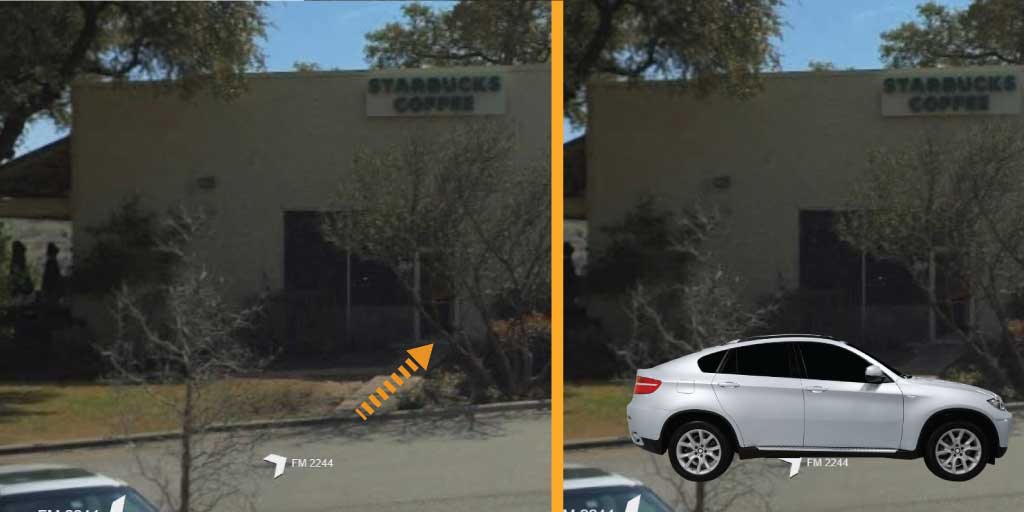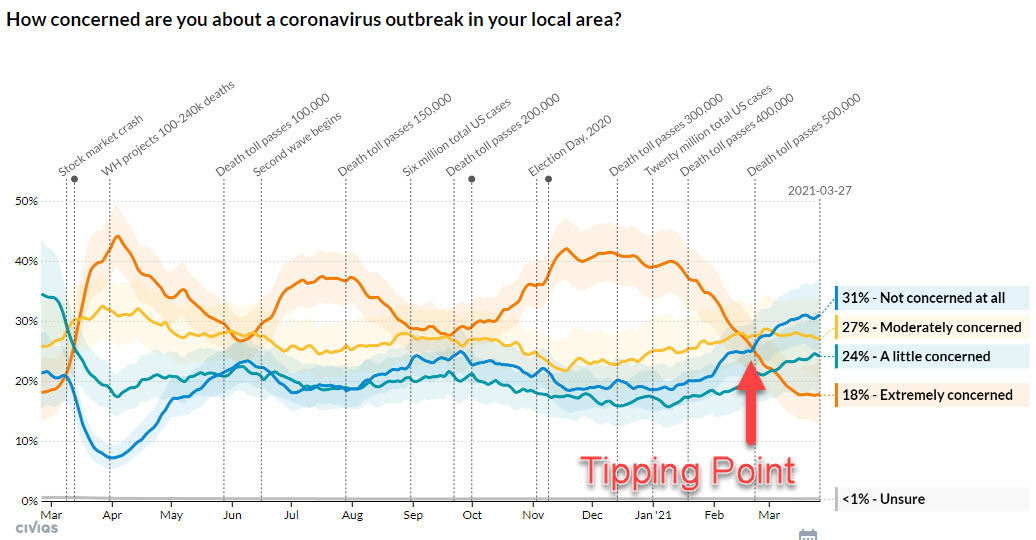
We hit a tipping point in February. And customer behavior is already changing.
Do you see the signs? More importantly, how is your business responding to this tipping point?
I almost missed it.
My first response was anger. And that anger almost blinded me from an important insight.
It started a couple months ago. While I was driving through the parking lot, someone stopped.
They parked themselves in the middle of the road and at the front door of the grocery store. Leisurely, they loaded groceries into their SUV. Without a care in the world, they loaded groceries … while I waited. That time I kept my calm.
“There’s always some random inconsiderate jerk out there …” as I rationalized the single rogue incident. But it happened again …
And again …
And again …
And again …
It’s been happening about once a week … and I don’t even make daily trips to the store. Now it’s happening at my local coffee shop.
Customers are starting to block the popular side-entrance to my coffee shop. So, you must walk around the car, and through the flower bed to get your mug of brew.

I was shocked and angered. But I forgot an important question.
“Why?”
What’s caused the change? Because my community doesn’t normally act this way. And in my anger, I almost missed an important insight.
People “act out” when they’re trying to gain control. And I believe that’s what I’m seeing. But why now?
We crossed a threshold in February[1] of this year.
For the first time since the pandemic, Americans who are “not concerned at all” about a local outbreak outnumbered Americans who are “extremely concerned.” We’ve hit a tipping point. But please don’t mishear me.

This is not a commentary about Coronavirus or civic response. Once I put my own anger aside, I was able to see the more important questions for your business.
What’s causing this behavior?
I believe folks feel like their life is out of control. And they’re acting out in ways that make them feel in control.
This is a common behavior in kids, adults, and even dogs. When we don’t like the status quo, we look for ways of changing it. And that often means disrupting unrelated things that we can change – because we feel like we can’t act on the core issue that’s bothering us.
A perfectionists’ insatiable need for control over seemingly “little things” may stem from growing up in a chaotic and inconsistent environment. Perfectionism gives them a sense of control.
Sometimes a dog will go potty in the house because they are craving attention. So, they are taking control.
Children may “melt down” in a public place because it can often give them control over what they want.
Pew Research found that 89% of Americans mentioned at least one negative change in their lives as a result of the pandemic[2]. But only 73% mentioned an unexpected upside.
One woman in the 50 – 64 age range said:
“I’m feeling confined in a way that I never thought I would ever experience. I feel like I’m suffocating (not literally) by being told what to do, or not do, and when to do it, if at all. It’s been very stressful.”
As humans, we crave control. And when we feel like we’ve lost control, we start looking for ways to regain control.
At one point I was ready to challenge one of these people that parked in front of the grocery store. When I examined my motives, I was just trying to gain control over their behavior. Yes, I find their behavior to be selfish and unthoughtful. But if I responded in anger, I’d be guilty of trying to assert the same control as they are.
So, why is this behavior a recent phenomenon?
I believe it’s a product of the tipping point above. The number of people who are extremely concerned about the pandemic dropped below the number of people who are not concerned at all. The pandemic is no longer the biggest problem in their life. NOW, the biggest problem is the loss of control over their life.
Again, I’m not making commentary about the pandemic … or what we should do or believe about the pandemic. I’m just observing human behavior … trying to make sense of it … and looking for clues for how you can grow your business during this transition.
Here are some additional comments from the Pew Research study:
“I live in a senior retirement community and we have had to curtail all the activities that have brought me meaning and joy in the past years. This includes our Sunday church services and many musical activities which always meant a lot to me.” – A woman, 65+
“We haven’t been able to get services we’ve needed, like dental services, because of stay-at-home orders.” – A man, 30-49
“The destruction of our routines has been disorienting.” – A man, 65+
“Only effect is that I no longer have freedom to travel, dine and enjoy everyday activities as prior to pandemic.” – A man, 65+
“People without masks make me irritable. They are inconsiderate and self-centered. Avoiding them is a huge focus.” – A woman, 50-64
Look at the emotions packed into those statements. Is it any surprise that people are starting to act out?
How should your business respond?
Review your messaging and offerings. How can you gift folks a sense of control in exchange for them working with you? Or buying from you?
(Even in the best of times) people crave control. But the need for control is especially strong now. So …
- Can you offer payment options?
- Can you offer two or three choices? (More than three choices overwhelms the brain, and only one choice is stifling.)
- How can you give them a sense of power or accomplishment?
- What are things that cost you nothing, but are valuable to them?
Let me lead by example …
Here are two options for you. Try one or try both. Your choice. You’re in control.
Option 1:
Get 30-day access to our self-paced course: 10 Days to Your Ideal Customer Persona.
This will help you discover the language your customer craves. It’s the language of transformation. Because at the end of the day, they don’t care about your product or service. They care about the transformation it delivers. Give them the power to transform their lives.
Option 2:
Join our next 5-Day Trust Accelerator Challenge.
You’ll learn how to build trust rapidly … even when you can’t meet face-to-face. Don’t allow the limitations of the pandemic keep you down. Overcome them with a proven framework.
[1] https://civiqs.com/results/coronavirus_concern?uncertainty=true&annotations=true&zoomIn=true&trendline=true
[2] https://www.pewresearch.org/2021/03/05/in-their-own-words-americans-describe-the-struggles-and-silver-linings-of-the-covid-19-pandemic/

